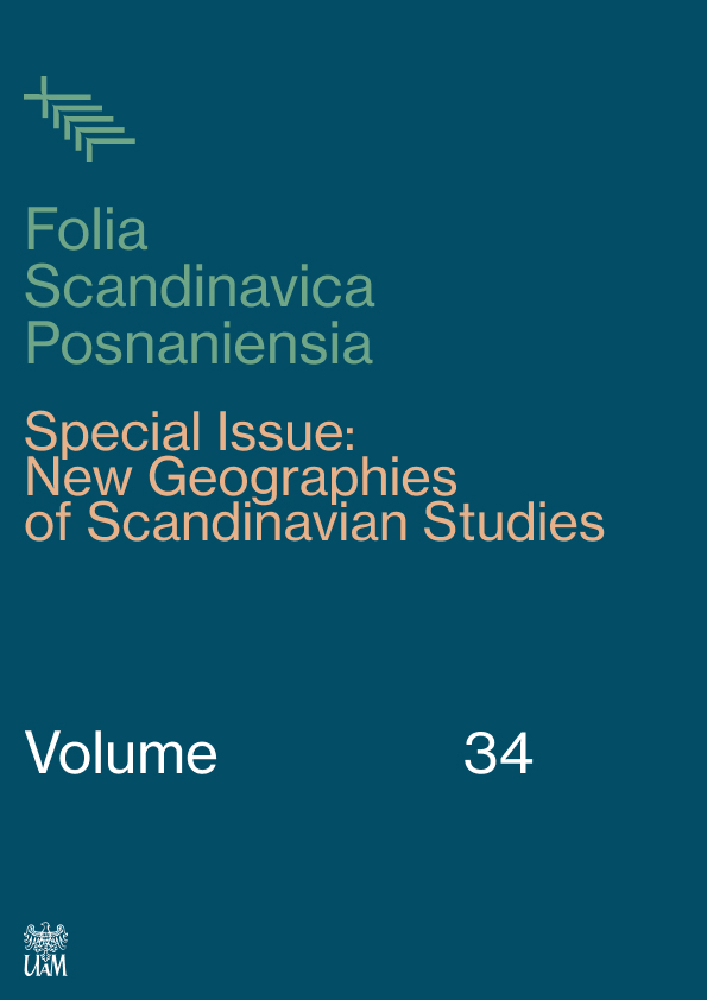Abstract
The article presents a discussion of Finnish-Estonian author Sofi Oksanen’s 2019 novel Dog Park (Koirapuisto), a social and psychological thriller about two Ukrainian women working in the Ukrainian fertility industry, offering surrogacy services to Western clients. The novel explores some of the new modes of exchange and cultural encounter that were established between Ukraine and the West after the collapse of the Soviet Union. It presents a reflection of the social and human consequences of the transition from communism to capitalism but is also a story of how the legacy of Cold War geopolitics continues to shape European mental geographies and experiences at the intersection of East and West. Drawing on concepts from human geography and postcolonial studies, the article offers a reading of Oksanen’s novel focusing especially on how the novel negotiates these geopolitical shifts as well as the position of the Nordic countries on the changing European map.
References
Ash, T. G., Krastev, I. & Leonard, M. (2023). United West, divided from the rest: Global public opinion on year into Russia’s war on Ukraine. European Council on Foreign Relations. ecfr.eu. Retrieved from https://ecfr.eu/publication/united-west-divided-from-the-rest-global-public-opinion-one-year-into-russias-war-on-ukraine/ (accessed 14 September 2023).
Chernetsky, V., Condee, N., Ram, H. & Spivak, G. (2006). Conference debates: Are we postcolonial? PostSoviet Space. PMLA 121, 828–836. DOI: https://doi.org/10.1632/S0030812900165903
Cresswell, T. (2014). Place: An introduction. 2nd ed. Hoboken: Wiley.
Czapliński, P. (2020). Literature and geography. Porównania 27(2), 143–166. DOI: https://doi.org/10.14746/por.2020.2.8
Czapliński, P. (2023). Coming to terms with the North. Scandinavia in Polish culture at the turn of the 21st century. Folia Scandinavica Posnaniensia 34, 16–30.
Harding, L. (2015). Sofi Oksanen: We know about British colonialism. Russian colonialism is not well known. Interview by Luke Harding. The Guardian. Retrieved from https://www.theguardian.com/books/2015/apr/18/sofi-oksanen-interview-russia-finland-estonia-putin (accessed 15 November 2023).
Laanes, E. (2021). Born translated memories: Transcultural memorial forms, domestication and foreignization. Memory Studies 14(1), 41–57. DOI: https://doi.org/10.1177/1750698020976459
Lehtimäki, M. (2022). Sofi Oksasen romaanitaide. Kertomus, etiikka, retoriikka. Retrieved from https://library.oapen.org/handle/20.500.12657/57877 (accessed 15 November 2023). DOI: https://doi.org/10.21435/skst.1482
Moore, D. C. (2006). Is the Post- in Postcolonial the Post- in Post-Soviet? Towards a global Postcolonial critique. In V. Kelertas (ed.), Baltic Postcolonialism (pp. 11–43). Amsterdam, New York: Rodopi. DOI: https://doi.org/10.1163/9789401202770_004
Mrozewicz, A. E. (2016). Postmemory, stereotype, and the return home. Rewriting pre-existing narratives in Sofi Oksanen’s “Purge”. Folia Scandinavica Posnaniensia 19, 133–152. DOI: https://doi.org/10.1515/fsp-2016-0010
Oksanen, S. (2015). A lion in a cage. On the finlandization of Europe. Eurozine, June 19, 2015. Retrieved from https://www.eurozine.com/a-lion-in-a-cage/ (accessed 14 September 2023).
Oksanen, S. (2021). Dog Park. Translated by Owen F. Witesman. London: Atlantic Books.
Oksanen, S. (2023). Putin’s war against women. Conference: Thought and truth under pressure. Svenska Akademien, Stockholm, March 22, 2023.
Oksanen, S. & Stock, F. (2022). On “art and occupation”. American Purpose, July 20, 2022. Retrieved from https://www.youtube.com/watch?v=k1CiIsHngEU (accessed 14 September 2023).
Snochowska-Gonzales, C. (2012). Post-colonial Poland – On an unavoidable misuse. East European Politics & Societies 26(4), 708–723. DOI: https://doi.org/10.1177/0888325412448473
Sušová-Salminen, V. (2012). Rethinking the idea of Eastern Europe from a postcolonial perspective. In K. Alenius & O. K. Fält (eds.), Vieraan Rajalla, Studia Historica Septentrionalia 64 (pp. 191–209). Rovaniemi.
Thompson, E. (2010). Whose discourse? Telling the story in Post-Communist Poland. The other shore: Slavic and East European cultures abroad, past and present 1(1), 1–15.
Thompson, E (2014). It is colonialism after all: Some epistemological remarks. Teksty Drugie 1, 67–81.
Tuan, Y.-F (1977). Space and place: The perspective of experience. Minneapolis: University of Minnesota Press.
Witt-Brattström, E. (2014). The dark history in Sofi Oksanen’s writing. The history of Nordic women’s literature, 1 December 2014. Retrieved from https://nordicwomensliterature.net/2014/12/01/the-dark-history-in-sofi-oksanens-writing/ (accessed 14 September 2023).
License
Copyright (c) 2023 Torben Jelsbak

This work is licensed under a Creative Commons Attribution 4.0 International License.

